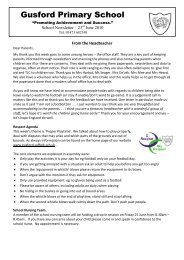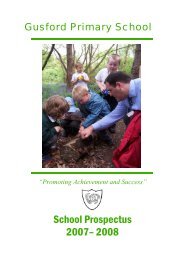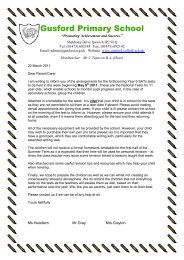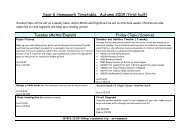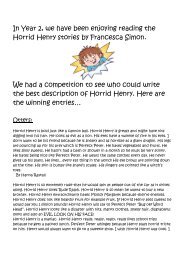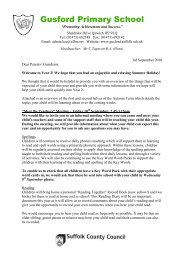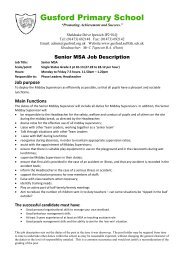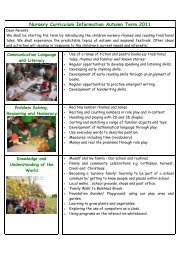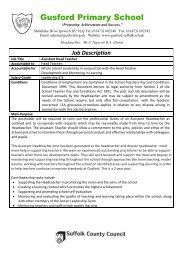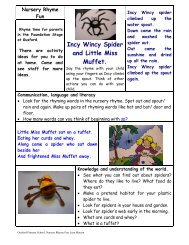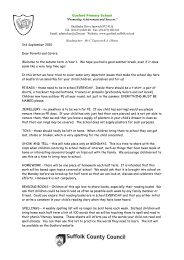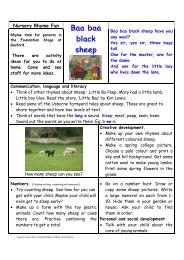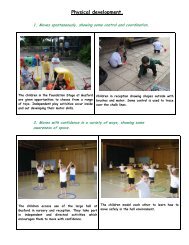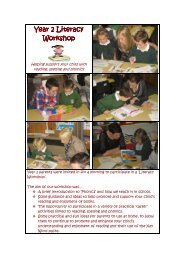Gusford Early Years Foundation Stage - Gusford Primary School
Gusford Early Years Foundation Stage - Gusford Primary School
Gusford Early Years Foundation Stage - Gusford Primary School
Create successful ePaper yourself
Turn your PDF publications into a flip-book with our unique Google optimized e-Paper software.
<strong>Gusford</strong> <strong>Early</strong> <strong>Years</strong> <strong>Foundation</strong> <strong>Stage</strong>September 2008<strong>Gusford</strong> has a 52 place purpose built nursery which opened in September 2002. There is anenclosed secure outdoor play area and garden. Children who attend our nursery usually startin the afternoon then move to the older morning group. Children usually spend only two termsin our nursery due to the high numbers of 4 year olds being given places. Approximately halfcome out of catchment from a wide range of social and private housing. The nursery is openduring term time only, however the school offers out of school care in the morning in adifferent area of the school. Groups for September 2008 will have mainly two term childrenwith a couple of one term entries in the morning. Few children speak English as an additionallanguage however support from outside agencies including information letters in otherlanguages can be provided when needed. (Suffolk Families Information Service.) Adults aresought out who speak a particular language if there are difficulties.There is a qualified teacher ( job share at present) and teaching assistants with relevantN.V.Q or Cache diplomas Level 3. Permanent support staff have been supported through Level3 training. The Nursery and reception receive support from an advisory support teacher fromthe L.E.A. and SENCO from within the school.Children enter reception at three points of entry in Suffolk. Therefore the time spent in the<strong>Early</strong> <strong>Years</strong> <strong>Foundation</strong> <strong>Stage</strong> can be between 3 and 5 terms. (2 of those terms being parttime) The summer born children only have one term in reception. There can be up to 90 inreception by the summer term. Two classrooms at present have easy access to the secureplay area and plans are underway to move fences so that the third class will have the sameaccess by 2009. The autumn reception class is taught at present by the <strong>Foundation</strong> stagecoordinator and is joined usually through the year by new staff. The three points of entry toreception and continual induction of temporary new reception teachers who are not familiarwith <strong>Foundation</strong> is an area that causes us concern. (See final section for greater detail)Jean Matson. F.S.C. <strong>Gusford</strong> <strong>Primary</strong> <strong>School</strong>. Updated August 08.
Helping children to be healthy.Children’s health is well promoted through thorough and consistent procedures. Parents fill inmedical information forms on entry to nursery and reception. Any serious medical issue isdiscussed with the Senior Welfare assistant and medical support plans are draw up. There isat least one member of staff in nursery and reception that has up to date first aidqualification. Training for diabetes, nut allergy, asthma, epilepsy is updated regularly or whena child with medical issues enters our school. Parents and carers are asked to keep staffinformed of any changes in personal circumstances which may affect the children. There is astrict procedure for reporting infectious illnesses. Positive steps are taken to encourage andpromote children’s good health and they are encouraged from the start to manage their ownphysical needs. Nursery toilets are within the main room with sinks and soap at child height.Children are taught how to use the soap dispensers and paper towels from the start.Photographs and prompts are visually displayed to encourage children to be consistent withtheir personal hygiene. There is also a small shower facility in the nursery. Clear proceduresare in place if a child injures themselves and any injury to the head is reported to the parentduring school time and a written note sent home as well. This applies to our receptionchildren. Reception children have access to toilets outside two of the classrooms. Clear, visualprompts are displayed again and children are encouraged to be independent when managingtheir hygiene. (Staff have access to gloves, wipes, spare clothing in case of toilet accidents.)The boys’ toilets in reception has a urinal which the children may use as well. The sameprocedure occurs in reception if a child injures themselves. Parents are informed if the injuryis to the head or groin. Children are encouraged to wash hands before snacks and cookingactivities. Cooking takes place weekly in nursery and reception. A range of foods are made andhealthy eating is discussed. The children experience and enjoy eating a range of fruit andvegetables in nursery and reception. The school belong to the National Fruit Scheme andreception children benefit from an additional fruit snack in the afternoon. Children aretaught how to prepare very simple foods during cooking. eg making a sandwich or preparing afruit salad. Children are also shown how pastry, bread and healthy vegetable soups can bemade. Recipes are also sent home to encourage parents to prepare food and cook with theirchildren. Special dietary requirements or allergies are noted and adjustments are made. Goodhygiene when preparing food is encouraged. A small vegetable patch is grown in the<strong>Foundation</strong> garden. Potatoes, tomatoes, lettuces, radishes and runner beans have beenJean Matson. F.S.C. <strong>Gusford</strong> <strong>Primary</strong> <strong>School</strong>. Updated August 08.
successfully grown and harvested. A meal has been prepared by reception children to make anend of year lunch and reception and nursery children have used their own vegetables to makesoup in the autumn. ( See N and R year group web pages. Nice example Reception lunch 2007))A mixed herb patch is also grown and requests for herbs are made from up the school. Visitsfrom the school nurse and talks by the healthy teeth advisor give the children moreknowledge about developing a healthy life style. Water is available at all times to nursery andreception children. The children are encouraged to be independent and to drink frequently.Older children are encouraged to pour their own water. Snack time is usually shared togetherin nursery and reception which provides a lovely social time to get together. Rest areas areavailable in the quiet room in nursery and in the book area in reception. Cushions and blanketsare accessible for these times if needed. The kitchen in nursery has a washing machine andgood supply of hot water for washing cooking and snack containers. The school staff room hasa dishwasher available for use. Guidance is pinned up in the kitchen to remind staffprocedures when preparing snack. Rest and quiet times are encouraged in nursery andreception. Reception children often rest on the carpet after morning and lunch break. Theuse of calm, familiar music is a trigger which embeds the routine in reception. Relaxationtechniques are also used in different classes to encourage the children to relax and be calm.Nursery and reception have access to the outside areas at key times in ‘Over to You’ sessions.All areas of learning and development are encouraged outside as well as inside. A member ofstaff is always outside at these times. The outside area has been developed throughfundraising over the past two years and a small path goes through the shrubs and trees. Thegarden is fortunate to have a beautiful redwood tree with wooden seating around. The mainarea has a small hut which is used as a graphic’s shed at present. There is a small pond withstrong mess metal covering which has newts and toads. Frogs naturally lay spawn here now! Abird table and a range of feeders attract garden birds. Our bird boxes are annually occupiedby blue tits and great tits. Logs piles have a variety of creatures living within and the childrenexplore these. The children are actively encouraged to be responsible for and take a pride intheir outside area and no external help is needed. Staff and children proudly look after thearea. Plants grown by the children are sold to parents at the end of the summer term to helpraise further money. Children have access to child size brooms and rakes. They keep the barktidy and sweep up leaves in autumn. (Further development of this area is planned for 2008-09. See Development plans.) The children in nursery and reception have access to the schoolslarge and varied environment. There is a small woodland area near the pre-school,environmental garden and larger pond, large grassed areas with trees. In the next two yearsan exciting stage is planned to open up this area so children will have access from their mainarea down to the grassed area and the woods.) The children in nursery and reception aregiven opportunities to engage themselves in active learning. Their physical development isencouraged through a range of activities. Both nursery and all reception classes have accessto the schools large and small hall. All children are able to experience a wide range ofapparatus and small games equipment. A range of parachutes are also available for thechildren to use in the hall and outside. Outdoor play equipment can be selected or requestedby the children. Bikes and scooters are frequently taken onto the large infant playground forJean Matson. F.S.C. <strong>Gusford</strong> <strong>Primary</strong> <strong>School</strong>. Updated August 08.
use. Photographs of resources are being compiled so that children can choose items that arestored away. The playground is secure by a gate and staff have good visual contact with thechildren. Reception children have use of the schools’ outdoor swimming pool in the summer.Many of our 5 year olds learn to swim during this time. The outside area is awaiting its nextstage of development at the moment. The area between the two reception classes is plannedbe covered in 08-09 allowing more equipment to be out during wet days. Fund raising during08 has raised money to purchase quality rain wear. All children are encouraged to bringwellingtons to school. Later developments and collaboration with Brookside Pre- school willallow the <strong>Foundation</strong> children safe access onto the field and into our woods. (09-10?) This willgive us further opportunities to develop and extend outdoor activities. Children in receptionand nursery are encouraged to think about their bodies and their fitness. Children areencouraged to walk to school during special weeks.Helping Children to stay safe.The purpose built nursery has high handled doors between the nursery and cloakroom. Theoutside doors can be accessed only by a code. The inner cloakroom door is accessed from theschool as a normal route. Toilet doors outside nursery are kept shut. Disabled access to toiletis also available. The nursery has good ventilation system and is light and airy. (There is anelectric filter system that can be operated by a switch). The smaller group room is of acalming blue colour which was especially chosen. The main activity room is a light yellow toinspire creativity. The room has an attractive homely appearance. Reception classroom havehigh ceilings with roof vents which help keep the rooms cool in summer. The main ceilings oftwo of the traditional classrooms are wood clad. Children have access to a range of goodquality equipment and toys. Labelling allows a high percentage of independent use. Childrenare encouraged to ask for resources which may be inaccessible. Photo prompts help childrento make selections in reception as well. Money from additional fund raising is being used topurchase new storage containers for the reception classes. The children in nursery accessthe toilets from the main play area yet are still visible by staff in case of problems. A widerange of resources are stored at child level with labels and photos on the boxes. The outsideand inside areas of nursery and reception have an annual risk assessment and safety check.Risk assessments are made prior to local walks. Staff make a general check of the outsidearea in the morning/ lunch time and particularly after a weekend.Responsibility is sharedbetween <strong>Foundation</strong> staff.Any toys or equipment in need of repair are removed. Regular fireJean Matson. F.S.C. <strong>Gusford</strong> <strong>Primary</strong> <strong>School</strong>. Updated August 08.
drills in school take place to ensure children and staff know the routines. Fire equipment ischecked regularly and electrical equipment has annual check and labelled. Staff are vigilant atend of sessions and know which adults are collecting the children. The small team are familiarwith routines and procedures concerning unfamiliar adults. Children’s welfare is of a highpriority in nursery and reception classes. Children in nursery and reception are encouraged tobe part of our ‘<strong>Gusford</strong> Family’. (Parents have commented on this atmosphere)The childrenare supported in learning how to play and work in a positive way. Positive interactions areencouraged and children are taught how to be responsible for their own behaviour andactions. Staff encourage children to participate, make appropriate choices and share.Children are encouraged to think about safety and keeping safe. For example: in reception thechildren early on are taught to tuck chairs under tables to avoid tripping, to walk around aroom, pick up toys and pencils or along a corridor. Equal opportunities are encouragedthroughout <strong>Foundation</strong> <strong>Stage</strong> and this is actively encouraged and supported by all staff.Children are helped to feel secure and happy within the <strong>Foundation</strong> <strong>Stage</strong> at <strong>Gusford</strong>.Personal, social and emotional wellbeing of the children has the highest priority.Helping children achieve well and enjoy what they do.The children in nursery and reception enjoy their time with us and have a good attitude tolearning. They are happy, settled and purposefully engaged in a range of activities. Staff havehigh expectations of the children and support them well. Staff will be using the new <strong>Early</strong><strong>Years</strong> <strong>Foundation</strong> <strong>Stage</strong> document as their long term plan in September 08 and training hasoccurred throughout the summer term, in school and outside. An action plan has been drawnup which is being adjusted where needed. A yearly planner will be introduced to map outactions and other aspects for the year. This will be an ongoing document. A new member ofstaff is joining the job share in nursery in September and in school induction will take place.Training opportunities will be organised so that the teacher is aware of new regulations andalso become familiar with the <strong>Foundation</strong> <strong>Stage</strong>. ( eg: observation and assessment.) Staff arecurrently in the process of developing more consistent systems for observations andassessment throughout <strong>Foundation</strong>. This is one of our key focuses for this year. Consistentobservations leading to completing the <strong>Early</strong> <strong>Years</strong> <strong>Foundation</strong> Profile is essential. (See issueof continual new and often inexperienced staff in reception) In house training in Septemberwill help to remind staff of requirements. Further in house training will occur during the year,Jean Matson. F.S.C. <strong>Gusford</strong> <strong>Primary</strong> <strong>School</strong>. Updated August 08.
particularly when new staff join the team. The <strong>Foundation</strong> <strong>Stage</strong> coordinator has workedclosely with deputy head (assessment coordinator) throughout this last year to ensureconsistency and realistic assessments are now being made. We still have issues with thesummer term class and with the limited amount of time before data is submitted.Assessments for this class in the summer were very cautious. (As a result average overalldata skewed to lower than previous years.) Staff are taking on board the new ‘responsiveplanning’ and will support each other within the team through the first term and year. Formerplanning folders will be used as resource folders within the <strong>Foundation</strong> <strong>Stage</strong>. Staff willcontinue to regularly observe the children which will inform the planning. Staff will beworking on further developing the outside area this year to allow children to access all areasof learning through an interesting and enriched environment. There will be observation bystaff within ‘Child initiated learning’ slots in the ‘Over to You’ time. Each member of staff willhave an observation folder and follow the ‘observation and assessment’ procedure for the<strong>Foundation</strong> <strong>Stage</strong> at <strong>Gusford</strong>. (See document) Parents will continue to be involved in thepartnership of observation. Nursery will continue to use the WOW board and reception thehome/school diary. Parent partnership with school is vital to make a success of the children’slearning and development. There is a balance of adult led/ structured activities withindependent ‘child initiated’ activities. 80% of observations will be made on C.I.L. by staff. Itwill be essential that next steps in learning are noted. This will need to be monitored during08-09. Collating of Profile data will be made by <strong>Foundation</strong> <strong>Stage</strong> coordinator with D.H. toensure consistency. (Data from 07-08 needs to be looked at carefully alongside annotations)Entry data/ information from Pre schools will have to be looked at in the light that it isunlikely to be presented in the age related bands from the New EYFS for September.Discussion early on in the autumn term will come to some consensus how it will be transferred.The autumn reception group will receive data in present form from our nursery which will bethen transferred to new ‘Learning Journey’ formats. (We are still awaiting CD from County inorder for us to personalise the children’s ‘Learning Journey’ folder.(Aug 08) Discussion hasalready taken place with nursery staff to target key individuals /groups as they enterreception. SENCO informed of any support needed. A Key Person approach is beingintroduced from Sept 08. In a large school nursery and reception with classes for 4-5 yearolds this may be difficult. Nursery will trial splitting the groups with their key person forsome social, snack, story activities. Parents may still wish to speak to the teacher, however,about some issues. ( IN school nurseries there are only two adults) In reception the KeyPerson role will be a buddy system between the teacher and TAs. This is because later in theyear full TA cover is not always available and the teacher can be the only adult at times.Teacher and TA will take turns letting the children in and out to give parents a chance tobuild up communication with both adults. This will also occur in nursery where one adultstands at the main door and one inside nursery. Parent feedback from nursery and receptionindicates strongly that parents find all staff supportive and helpful.(feedback forms)The child initiated approach to a high percentage of their learning ensures that activities areof particular interest to the children. (See nursery and reception year group pages for widerange of exciting and unusual activities 2007-08) Predictable topics and seasonal themes willJean Matson. F.S.C. <strong>Gusford</strong> <strong>Primary</strong> <strong>School</strong>. Updated August 08.
e adjusted to meet with the current needs and interests of the children at all times. Staffencourage the children to develop their confidence and independence. Staff expect a highlevel of behaviour and support children who need strategies. Staff have had previous childrenat the pupil referral unit and have a great deal of experience when working with children whoexhibit challenging behaviour. A high % of staff have had training at First Base. (Pupilreferral unit) Staff use consistent language when working with these children. All the staffworking in <strong>Foundation</strong> have a good relationship with the children. Parent questionnaires havereplied very positively to this. (See responses from summer 07 and termly feedback fromnursery) Staff give the children many opportunities to be involved in active learning. Localwalks to the woods and meadows are taken by reception and their families. This encouragesfamilies to get to know their local environment and community. ( Local walk information forroutes are put on the parent page) Frequent visitors come into nursery and reception. (Seeweb pages for year groups) Communication with parents help staff provide activities that arecurrent to the children’s interests. Staff also bring in interests and ideas that help to givethe children a wider view of the world they live in. Staff at <strong>Gusford</strong> have had training fromCounty in implementation of Post Rose Report. Letters and Sounds. (See <strong>Foundation</strong> <strong>Stage</strong>coordinator report to Literacy advisor re first year 07-08 implementation.) Phase one isintroduced in nursery with elements of Phase two for children who are ready. Phonics andrelated sound work is taught in an active/ multi sensory interesting way. Phonics is taught in asystematic way in reception in discrete learning slots. Skills are reinforced and applied in across curricular way through all activities. All activities can take either inside or out. This ishighly valued by staff. (see year group web pages)Helping children make a positive contribution.We aim to help the children and their families to develop a sense of belonging in the<strong>Foundation</strong> <strong>Stage</strong> at <strong>Gusford</strong>. Parents feel very welcome by staff. (See feedback forms)Parents are encouraged to get involved with their children’s learning and development througha wide range of opportunities. Family Learning workshops and courses are put on regularly andorganised by the <strong>Foundation</strong> <strong>Stage</strong> Leader. Regular activity afternoons and sessions are puton each term by nursery and reception. These are attended by a range of families andextended members when parents cannot attend. We are always oversubscribed with these.Courses leading to City and Guild qualifications are offered within the Family Learningcourses. Parents are encouraged to have a strong involvement with their children. MutualJean Matson. F.S.C. <strong>Gusford</strong> <strong>Primary</strong> <strong>School</strong>. Updated August 08.
support between home and school helps the children and their families to have highaspirations of the children. Parents and carers are actively encouraged to be involved inclass. Positive relationships with families are actively encouraged and ways of developing thisfurther are being considered for the next year. Children are encouraged to be independentand have self confidence in themselves. <strong>Early</strong> independence and use of initiative is activelyencouraged. Children are supported in how to apply practical skills in a variety of situations.Reading and play ‘drop in’ sessions are organised for nursery at a start of a session and forreception at the end of the day after play. These hopefully will be put on weekly in theautumn. Opinions and views are sought through regular questionnaires. Nursery and receptionsend out weekly photographic newsletters to parents. A ‘Home Challenge’ is set each week forthe family. (See reception feedback evaluation 2008) All information is put on the website.Parents can access the year group pages to see events and curriculum information in nurseryand reception. There is an up to date parent page and early learning page where families canprint off support material to help learning at home. The link between home and school istreated with great value. Photographs are displayed in key areas around the school. Specialphotographic books are made up of activities and stored alongside the other books in class.Photographic information has been put on the early learning web page to explain the <strong>Early</strong><strong>Years</strong> <strong>Foundation</strong> <strong>Stage</strong> profile. All scale points have been referred to. Nursery has a similarweb page explaining learning and development in the nursery. The new ‘Learning Journey’booklets will be introduced in September 08 which will track a child’s interests anddevelopment throughout the <strong>Early</strong> <strong>Years</strong> <strong>Foundation</strong> <strong>Stage</strong> at <strong>Gusford</strong>. Information andobservations from parents will be equally valued. ( Information to guide parents at home withobservations is on the school website.) Staff are forward thinking in helping children to gainthe most from their time with us. Staff are aware of varying learning styles and preferences.Children are given opportunities to learn about their world and other cultures in an activeways. Boxes of different genre books and resources are collected and displayed throughoutthe year. Staff use the interactive whiteboards to access photographic information aboutthe world. The internet is used to look up information and an enquiring mind is activelyencouraged. Quality speaking and listening is encouraged. Set phrases and conventions ofspeech are learnt early. ‘Please may I? / May I go to the toilet? etc. Equal opportunities areparamount and all children are given the chance to select activities. Main focussed activitiesare well planned and differentiation adjusted to meet the needs of all children. Learningsupport is given by the school’s SENCO and communication starts early on. Staff provide goodrole models for behaviour and social interaction. Children are actively encouraged to playgames together and learn how to solve problems. Strategies are practised to support trickytimes. The ‘Learning Journey’ record will be available for parents to discuss with staff.Home/ school diaries with post it notes in reception will contribute to the individual record.Post it notes/ stickers in nursery will also be used in a similar way. The two way sharing ofinformation will continue to enhance their learning and development. A new notice board isplanned for inside the nursery cloakroom which will display up to date <strong>Foundation</strong> informationfor parents and carers. (Board to be ordered Sept 08)Jean Matson. F.S.C. <strong>Gusford</strong> <strong>Primary</strong> <strong>School</strong>. Updated August 08.
Developing the children’s skills for the future.Children in <strong>Foundation</strong> <strong>Stage</strong> are supported by staff who actively encourage independence.Children are given opportunities:• to make decisions and be inquisitive about the world in which they live.• to access an active, practical curriculum in order to use and apply skills and knowledge.• to work and play together, to learn to take turns and share.• to learn how to deal with tricky situations in class and outside in play situations. Skillsof compromise and negotiation are taught and modelled by staff.• to problem solve using a range of skills.• to use their strengths in order to be confident and successful.• to understand that learning comes from mistakes.• to use a range of learning styles in order to access the curriculum. V.A.K.Families are encouraged to be involved with their child’s learning and development through:• Home/school observations.(post it notes/ stickers)• Home/school diaries.• Parents are encouraged into class at end of the day so that children may show andshare. Photos are displayed on the interactive whiteboard to show parents specialevents that may have happened in the day.• Parents are permitted to use class computer to use school website.• Information on newsletters and website.• Home Challenge is set each week in reception.• Families are involved in activity sessions in nursery and reception on a regular basis.• Family Learning Workshops are offered and are frequently over subscribed.• Longer courses are offered which can lead to parents/ grandparents gaining City andGuild qualifications.• We encourage families to have high aspirations for their children.Jean Matson. F.S.C. <strong>Gusford</strong> <strong>Primary</strong> <strong>School</strong>. Updated August 08.
• Advice and support is given by <strong>Foundation</strong> <strong>Stage</strong> coordinator to parents who wish togain further qualifications. Parents have been supported with NVQ qualifications.(Twohave been employed as teaching assistants.Children are encouraged to use information technology to help them make progress. Nurseryand reception children use a range of technology in school:• Class computers• Each class has an interactive whiteboard.• Children have opportunities to access the internet to discover about their world.• Digital cameras are used by children to record significant moments.• Digiblu and digital cameras record activities that can be shared in class.• Walkie talkies are used in play situations and between classes.• Children’s writing and pictures are used to make up booklets for the class. They arephotocopied or printed from the computer. Children are shown how these books can bemade.• Cassette recorders are used to record children talking, singing, playing music andreporting on things.• Children are taught how to use the CD players in class to play stories and songs.• Telephones are also used at times in school with supervision by staff.• Romers and Bee Bots are used by the children.• Children are encouraged to use correct forms of speech in a range of situations. Theyare encouraged to give their opinions and talk about things that interest them. Theymay use phrases such as ‘’I think or I know that…… because. Good role modelling helpsthe children in this area. Numeracy and literacy is taught in a cross curricular ways sochildren reinforce skills and knowledge in a range of practical and every day situations.OrganisationThe staff within the <strong>Foundation</strong> <strong>Stage</strong> are energetic, dedicated and have a passion for thisage group. They work very well as a team and support each other. They are committed toimprovement and development within the phase. New ideas are adapted and taken on board toimprove the quality of learning and environment. Staff are aware of their roles andresponsibilities and work well together supporting induction of new staff, Regular meetingsand discussions help staff reflect on their practice. Minutes of meeting are logged and copiessent to Senior Management/ Phase Leaders so they are aware of what is happening in<strong>Foundation</strong>. Induction procedures to into nursery and to reception are clear and sensitive tothe needs of the children at <strong>Gusford</strong>. Staff meet twice termly with other settings in thearea to 1.) discuss transfer and 2.) a particular current topic suggested by the group. RegularJean Matson. F.S.C. <strong>Gusford</strong> <strong>Primary</strong> <strong>School</strong>. Updated August 08.
meetings occur between Brookside Pre school manager and <strong>Gusford</strong>’s FS coordinator. A high% of our children come from Brookside and transition and continuity of provision is discussed.Transition is being developed for 2008-09 with further communication with pre schoolproviders. Other preschools and nurseries have contact with <strong>Foundation</strong> <strong>Stage</strong> coordinator.Website information is given to them. Brookside has a link on their website to ours. The<strong>Foundation</strong> <strong>Stage</strong> governor is also chair of Brookside. <strong>Foundation</strong> <strong>Stage</strong> coordinator meetstermly with governor. Transition to year one is developing and <strong>Foundation</strong> Profile data ispassed on to teachers. Discussion with year one group leader takes place so that keyinformation can be passed on. Target children are identified for monitoring. This isparticularly important for our youngest children who have had so little time in reception. Datais put into new class groups on the computer so that year one staff can access the Profile.In Suffolk children enter full-time school the term they are five. Therefore at <strong>Gusford</strong>children will have between one and three terms in reception before moving to year one. Thereare three points of entry. The three points of entry to reception and continual induction ofnew staff who are not familiar with <strong>Foundation</strong> is an area that causes us continual concern.Most children entering reception will have been through the nursery. There is a morning andan afternoon nursery class. Each group takes up to 26 children. The majority of childrenentering our nursery will have two terms. One term in the afternoon and one term in themorning. Parents are happy with the established system for induction and are frequentlysurveyed on opinions. Children are able to visit the nursery with their parents the termbefore they start. (See partnership with parents information about induction) We had hadonly a few three termers since the nursery opened. The rest have all been four years oldwhen starting. Numbers have been well balanced on the whole and this pattern of organisationhas worked very well. (The previous OFSTED team (2004 Nov) thought that our inductionprogramme was good and organisation was sensitive to the needs of our children.)Occasionally we have one-term children who move straight into the morning group wherenumbers allow. We find our way of organising the nursery works well since all the childrenmove into our reception classes. The afternoon session gives us time to get to know thechildren well and settle them to nursery life at <strong>Gusford</strong>. (With the introduction of the new<strong>Early</strong> <strong>Years</strong> <strong>Foundation</strong> <strong>Stage</strong> in September 08 and the possible shift in numbers/ ages ofnursery children projected for the next year the above organisation may be changed.)Allnursery children meet reception staff in different situations. The morning session helps thechildren get used to coming to school in the morning, moving onto a slightly more structuredroutine and mixing a little with the reception class/ classes. This is particularly valuable forthe children who only have one term in reception before moving to year one. One of our urpresent nursery teachers is also a very experienced reception teacher. Responses fromparents indicate that they like the way we organise the groups. (See samples of nurseryquestionnaire.) The main comment is that the children mix socially with their future receptiongroup early on and that the morning session and routine help them become ready for full timeJean Matson. F.S.C. <strong>Gusford</strong> <strong>Primary</strong> <strong>School</strong>. Updated August 08.
school. Parents frequently mention the family atmosphere of our <strong>Foundation</strong> <strong>Stage</strong>. Thechildren in the morning group experience use of the two halls, computer suite, celebrationassemblies and special school events before moving to reception. They also become familiarwith established staff. All this makes their move to reception easier.All information concerning the <strong>Early</strong> <strong>Years</strong> <strong>Foundation</strong> <strong>Stage</strong> is stored on hard copy with Mrs.Matson, (<strong>Foundation</strong> <strong>Stage</strong> coordinator) and on computer files for easy access. All staff havea folder with key documentation relating to our <strong>Foundation</strong> <strong>Stage</strong>.(To be updated Sept 08)Keep Folders have been ordered for all staff. There are photographic books available showingthe 6 areas of learning and the cross curricular nature of activities. There are examples ofnursery achievement books and reception work. There are further photographic examples ofthe range of activities and topics that children experience in the <strong>Early</strong> <strong>Years</strong> <strong>Foundation</strong><strong>Stage</strong> at <strong>Gusford</strong>. There is also a folder in the front entrance hall showing parentsphotographic examples of a range of activities and events. The nursery and reception yeargroup pages show a clear picture of activities carried out in <strong>Early</strong> <strong>Years</strong> <strong>Foundation</strong> <strong>Stage</strong>.The cross curricular nature of learning in the <strong>Early</strong> <strong>Years</strong> <strong>Foundation</strong> <strong>Stage</strong> is celebrated inthese pages. Parents have a dedicated ‘<strong>Early</strong> Learning’ home page which gives theminformation about how they can support them children. The <strong>Early</strong> <strong>Years</strong> <strong>Foundation</strong> <strong>Stage</strong>Profile has been explained with photographs and text to explain all 13 scales and points.Nursery and reception sent out weekly newsletters to parents celebrating events, activitiesand inform parents of what the children are learning. A ‘home challenge’ is set for familieseach week so they can be involved in their children’s learning. Parents are encouraged toshare observations of their children and these are added to the child’s ‘Learning Journey’achievement book. Planning and resource ideas is kept on computer folders and in folders sothat updates can be made.An action plan has been drawn up to help staff to prepare for the new EYFS in September 08.This will be very much ongoing and new elements will be added throughout next year. Theteam will be working very closely together. This will be very important since there are staffchanges in nursery. New ‘responsive planning’ is being trialed during the summer term 08.The ‘e’ profile is set up ready for information to be inputted during the year the childrenenter reception. This helps the Spring and Summer reception teachers. Regular meetingsoccur throughout the year to monitor progress/targets. <strong>Foundation</strong> <strong>Stage</strong> coordinatormonitors and analyses data and regularly meets with the deputy head (assessmentcoordinator) throughout the year. The nursery planning and assessment folders are kept inthe nursery. Resource folders for each term are also kept in the nursery and reception.There are current examples of nursery letters and photographs in the nursery. Examples ofprevious nursery letters are stored on computer to show variety.Jean Matson. F.S.C. <strong>Gusford</strong> <strong>Primary</strong> <strong>School</strong>. Updated August 08.
<strong>Foundation</strong> <strong>Stage</strong> Staff. (September 08)Nursery Teachers: Mrs. Nicola Frolish and Mrs.Sharon Race. These are experiencedteachers. Mrs Frolish is new to the <strong>Foundation</strong> <strong>Stage</strong> and will work closely alongside her jobshare partner. Induction training will be given. Nursery Assistant: Mrs Caroline King (Level 3 )Reception. The reception class is taught by Mrs. Jean Matson who is also <strong>Foundation</strong> <strong>Stage</strong>coordinator. (Mrs. Matson has had experience of teaching the whole <strong>Primary</strong> age range andhas acted as Deputy Head at <strong>Gusford</strong>. She also set up the nursery when it was established 5years ago and taught for two years in the nursery.)Reception Teaching assistants: Mrs Sheila Crocker N.V.Q 3 (08) Miss Jenny Gooch(<strong>Foundation</strong> <strong>Stage</strong> Senior teaching assistant+ P.P.A cover) B.A. Hons in <strong>Early</strong> ChildhoodStudies. (08)January Reception teacher 2009- unknown. Summer Reception teacher 2009 – unknown.Please speak to Mrs.Jean Matson if you have any other questions about the <strong>Foundation</strong> <strong>Stage</strong>at <strong>Gusford</strong>.Jean Matson. F.S.C. <strong>Gusford</strong> <strong>Primary</strong> <strong>School</strong>. Updated August 08.



